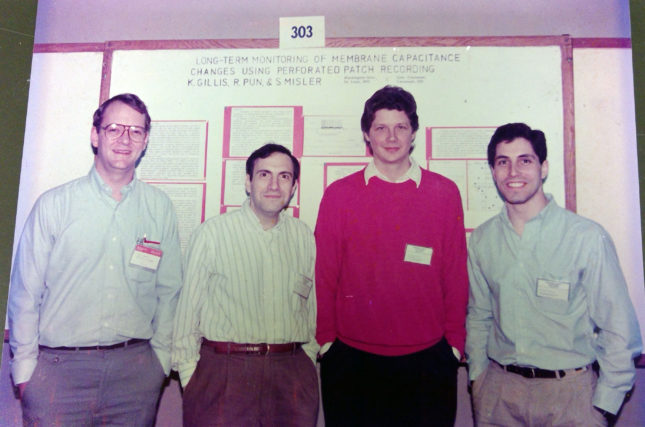Nephrologist Stanley Misler, MD, PhD, was recently recognized at the meeting of the 11th Annual Midwest Islet Club (MIC), hosted this year by Washington University.
Dr. Misler, Emeritus faculty member of the Departments of Medicine (Nephrology), Cell Biology/Physiology and Biomedical Engineering at WU, presented one of the Keynote Lacy Medal Award Lectures. Misler dedicated his talk to the memory of his mentor, Dr. Alex Mauro of Rockefeller University, “a seminal thinker in biophysics and cell biology and a true scientific humanist”.
The MIC meetings are intended to encourage greater communication and interaction between junior and senior pancreatic islet cell biology researchers within the Midwest region. Presentations highlight the latest in cutting-edge pancreatic islet beta-cell research relevant to both type-1 and -2 diabetes. The 2018 meeting was attended by approximately 150 investigators.
Students, postdoctoral fellows and newly independent investigators serve as the primary speakers at the conference, with the exception of the Keynote Lecture that was established in memory of the late Dr. Paul Lacy. Lacy, head of Pathology at Washington University from 1961-1985, was a world pioneer of pancreatic islet cell morphology and function, as well as isolation and transplantation of islets
All three Lacy Medal Award Lecturers for this year’s meeting were from Washington University School of Medicine. Joining Dr. Misler were Michael L. McDaniel, PhD, Emeritus Faculty, Department of Pathology and Immunology, and John Turk, MD, PhD, Alan A. and Edith L. Wolff Professor, Department of Medicine.

Picture taken at the Biophysical Society meeting in 1990. Left to right: Lee Falke, Stan Misler, Kevin Gillis, and David Pressel
Dr. Misler’s award was for “pioneering studies of the electrophysiology of stimulus-secretion coupling in pancreatic islet cells”. In a seminal study in 1986, Misler and McDaniel, along with biomedical engineering graduate students Lee Falke and Kevin Gillis, defined the metabolic and cytosolic nucleotide dependence of ATP-sensitive potassium channels. Later (1987-1992), Misler, Falke, Gillis, medical scientist training program student David Pressel, and electrical engineering graduate student David Barnett performed the first detailed electrophysiological studies of human islets, generously provided by Dr. David Scharp of Department of Surgery, a long time Lacy collaborator.
Thereafter, Misler with Gillis, Barnett (now Dean of Engineering, Lakehead University, Canada) and post-doctoral fellow Zhuan Zhou (now Professor, Peking University, Bejing), went on to define the links between calcium currents and insulin granule exocytosis using analog and digital lock-in amplifiers, home-designed by Gillis and Barnett, and carbon fiber electrodes for amperometry, home designed by Zhou.
As an introduction to the awards and lectures at the 2018 MIC meeting, Gillis, now Professor of Biomedical Engineering at University of Missouri (Columbia) reminisced about the “exciting time of fearless exploration in the lab in the late 1980s and ’90s when ion channels were new,” as well as the unique course on physiology and biophysics of ion channels that Misler gave to graduate students during marathon Friday afternoon sessions.
Leslie Satin, Professor of Pharmacology at University of Michigan in Ann Arbor, spoke about Misler’s funny and exciting lectures at international meetings as well as his eagerness to brainstorm, train graduate student of other universities and share home-built equipment with competitors before these items were commercially available.
Indeed, those lucky enough to attend Dr. Misler’s lectures will remember his enthusiastic and entertaining style of teaching, which often involved using poetry and music to interact with students. He was a valued mentor to current teachers of nephrology in our division.
Among his multiple teaching awards, Misler received the Samuel R. Goldstein Leadership Award in Medical Student Education in 2007. The Goldstein award is among the highest honors that teachers in the School of Medicine can achieve.
Although Dr. Misler officially retired from WU in the fall of 2015, he is still teaching.
“I was lucky to start volunteer teaching Humanities (World Literature, Philosophy, and Music) and Science (Biology and Physics) courses at the Metro Academic & Classical High School, a local public magnet school”, says Misler. “It brought me back to my humanities roots.” In addition, this experience prompted him to begin teaching courses at the Lifelong Learning Institute at Washington University. This past winter, Misler taught Shakespeare thru Music. “It was very well appreciated!”
This summer, pending sufficient registration, Misler will teach a course on The American Folk Music Revival (see course description here), as well as a two-semester course on Survey of Western Art Music this fall and winter. He hopes to teach something medically related in the spring of 2019. Currently, Dr. Misler is enjoying “making informative PowerPoint presentations with lots of embedded musical tracks snagged from YouTube.”
He is also looking forward to contributing to the reconfiguration of the 1st and 2nd year medical school courses, particularly the Physiology course, which he taught for nearly 30 years.
In addition to teaching and research, Misler was an attending nephrologist in Renal and Internal Medicine inpatient ward service from 1983-2009. He admits, “I miss doing clinical service! It’s fun to help out others and keeps one’s thinking very sharp.”